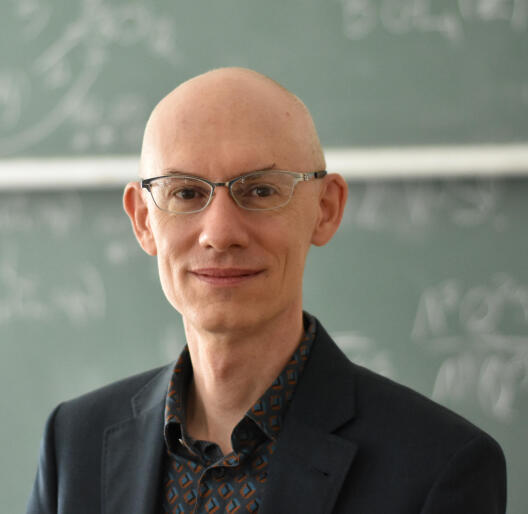Professor David Kerr

Since January 2021, Prof. David Kerr has been member of the Cluster of Excellence Mathematics Münster and has been teaching and carrying out research at the Department of Mathematics and Computer Science. His research focuses on ergodic theory and operator algebras.
Before coming to Münster, he worked at Texas A&M University for 15 years. Before that he held one-year postdocs in Rome (2002-2003), Tokyo (twice, in 2001-2002 and 2004-2005) and Münster (on a Humboldt Fellowship, in 2003-2004). He studied in Canada at the University of Waterloo and the University of Toronto – from where he also obtained his PhD.
David Kerr, please tell us something about your field of research.
My research lies in the fields of ergodic theory and operator algebras, two branches of analysis which emerged from classical and quantum physics, and which have benefited from a wealth of mutual interaction going back to their formal roots in the work of von Neumann in the 1920s.
What contributions do you make?
Much of my work has involved pushing this interaction in new directions, including the application of conceptual insights from operator algebras to the study of topological and measurable dynamics, especially through the theories of entropy and tilings. The overarching theme in all of this, indeed one that is common across analysis as a whole, but takes on special combinatorial and algebraic flavours in this case, is that of analyzing and classifying infinite-dimensional objects by means of both finite approximation and asymptotic behaviour.
What are you currently working on?
One of my current projects is trying to determine to what extent the concept of dynamical tileability (on the side of ergodic theory) can be reconciled with the classification theory of nuclear C*-algebras (on the side of operator algebras).
Why did you decide to come to the University of Münster?
I have had a long and fruitful relationship with the research group in operator algebras at the University of Münster, starting with my first visit as a student in the late 1990s. It was thus an easy decision to take up this exciting opportunity to join the institute, and I look forward to the many new challenges that my move to Münster has afforded.
Looking back, what was the most important moment in your career?
My two intellectual passions have always been architecture and mathematics. In fact, one of the most important events affecting my career trajectory was my switch, as a student, from the former to the latter. My career as a mathematician has opened up possibilities and opportunities far beyond what I could have imagined, and, as a bonus, it has even facilitated a much richer and rewarding engagement with architecture through international travel, with Münster and the neighbouring Ruhrgebiet as notable highlights.
published: November 2021

